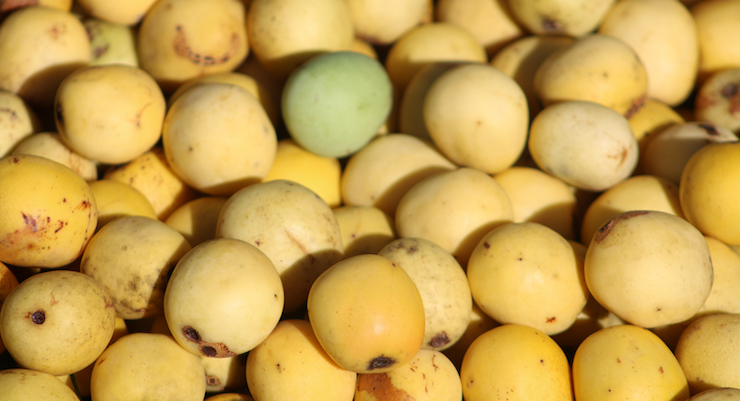06.11.21
An extract of Sclerocarya birrea, a fruit better known as marula, was evidenced in a recently-published clinical trial to improve glucose metabolism in patients with prediabetes following 90 days of supplementation.
Prediabetes, a serious health condition in which blood sugar levels are elevated but are below a threshold for type 2 diabetes diagnosis. It results in impairments to glucose tolerance, as well as increases to fasting glucose. “Prediabetes is increasingly recognized as an important metabolic state, predisposing individuals to progression to overt type 2 diabetes and diabetes-associated complications, such as diabetic retinopathy, neuropathy, nephropathy, and cardiovascular disease,” the authors of the study said.
In the present study, appearing in the journal Nutrients, researchers assigned 33 subjects to an experimental group, which ingested 100 mg of the extract daily for 90 days, along with a group of 34 subjects who were administered a placebo. All of the participants in the study were considered to have prediabetes.
According to oral glucose tests, the experimental group saw statistically significant decreases in serum glucose levels compared to baseline at both 40 and 90 days, while no changes were observed in the placebo group.
Compared to the placebo group, the group which took the marula extract also had better outcomes in tests of glucose peak, serum insulin, insulin resistance markers, and flow-mediated dilation, all of which are considered markers of a variety of metabolic processes. Further, there was “a trend for lower cholesterol levels and a decrease in body weight in the experimental group,” the authors wrote.
“The present results of the antidiabetic effects of Sclerocarya birrea are consistent with data previously reported in animal studies,” the authors wrote. In those studies, they said that several mechanisms of the plant extract could have been responsible for improved glucose levels and tolerance – previous evidence indicates that it could work by inhibiting enzymes within the gastrointestinal tract to reduce glucose absorption, or that it could be explained by the presence of some polyphenols which have been shown to inhibit glutamate dehydrogenase (GDH) activity.
“This exploratory clinical trial confirms the antidiabetic activity of a nutraceutical supplement based on a natural extract of Sclerocarya birrea in subjects with confirmed prediabetes, which is a clinically relevant finding in the prevention of type 2 diabetes,” the authors of the study concluded. “Further studies using better measurements of beta-cell function are needed to clarify the underlying mechanisms of the hypoglycemic effect of this natural compound.”
Prediabetes, a serious health condition in which blood sugar levels are elevated but are below a threshold for type 2 diabetes diagnosis. It results in impairments to glucose tolerance, as well as increases to fasting glucose. “Prediabetes is increasingly recognized as an important metabolic state, predisposing individuals to progression to overt type 2 diabetes and diabetes-associated complications, such as diabetic retinopathy, neuropathy, nephropathy, and cardiovascular disease,” the authors of the study said.
In the present study, appearing in the journal Nutrients, researchers assigned 33 subjects to an experimental group, which ingested 100 mg of the extract daily for 90 days, along with a group of 34 subjects who were administered a placebo. All of the participants in the study were considered to have prediabetes.
According to oral glucose tests, the experimental group saw statistically significant decreases in serum glucose levels compared to baseline at both 40 and 90 days, while no changes were observed in the placebo group.
Compared to the placebo group, the group which took the marula extract also had better outcomes in tests of glucose peak, serum insulin, insulin resistance markers, and flow-mediated dilation, all of which are considered markers of a variety of metabolic processes. Further, there was “a trend for lower cholesterol levels and a decrease in body weight in the experimental group,” the authors wrote.
“The present results of the antidiabetic effects of Sclerocarya birrea are consistent with data previously reported in animal studies,” the authors wrote. In those studies, they said that several mechanisms of the plant extract could have been responsible for improved glucose levels and tolerance – previous evidence indicates that it could work by inhibiting enzymes within the gastrointestinal tract to reduce glucose absorption, or that it could be explained by the presence of some polyphenols which have been shown to inhibit glutamate dehydrogenase (GDH) activity.
“This exploratory clinical trial confirms the antidiabetic activity of a nutraceutical supplement based on a natural extract of Sclerocarya birrea in subjects with confirmed prediabetes, which is a clinically relevant finding in the prevention of type 2 diabetes,” the authors of the study concluded. “Further studies using better measurements of beta-cell function are needed to clarify the underlying mechanisms of the hypoglycemic effect of this natural compound.”




























